Charles E W Bean, Diaries, AWM38 3DRL 606/87/1 - August 1917 - Part 4
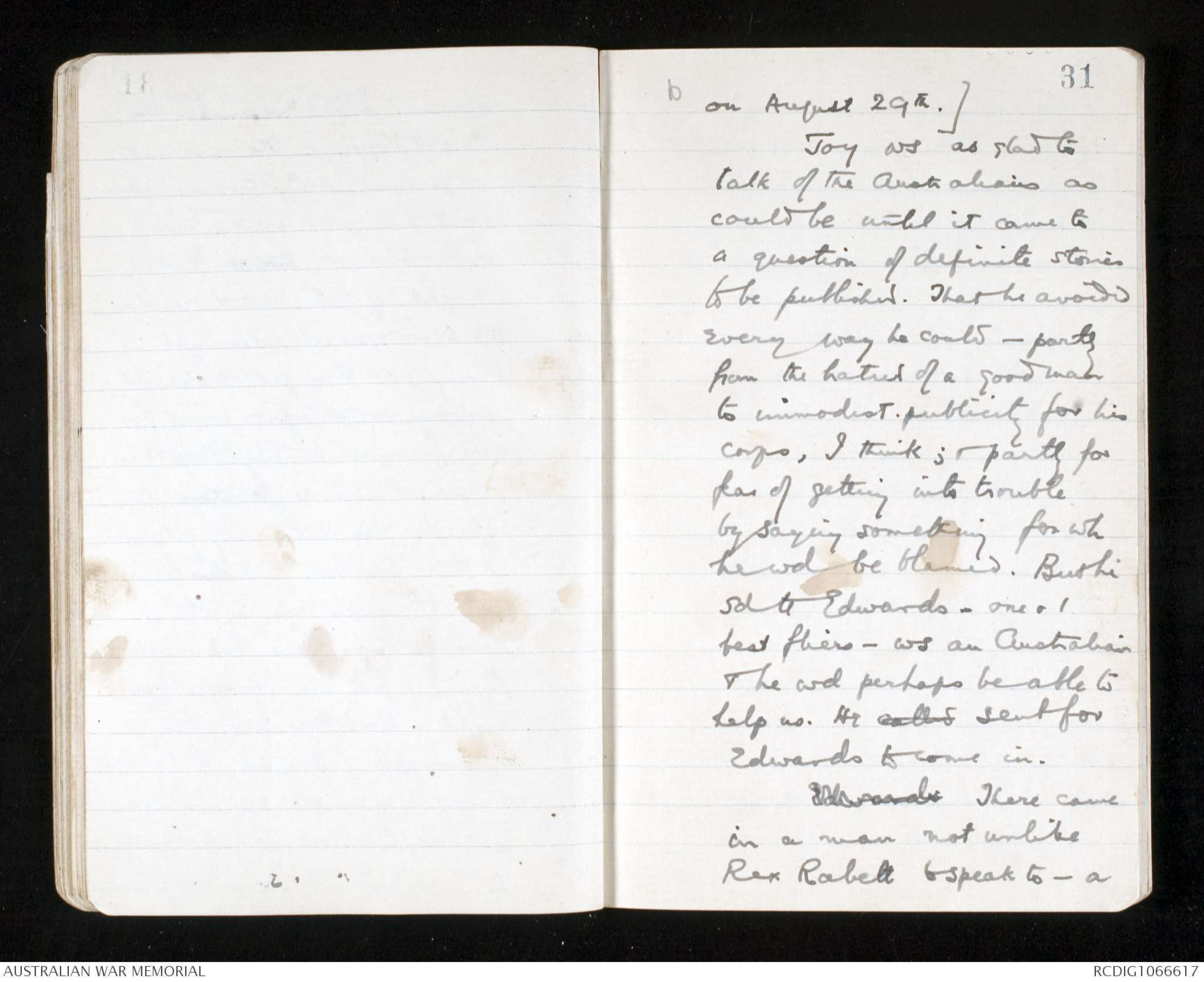
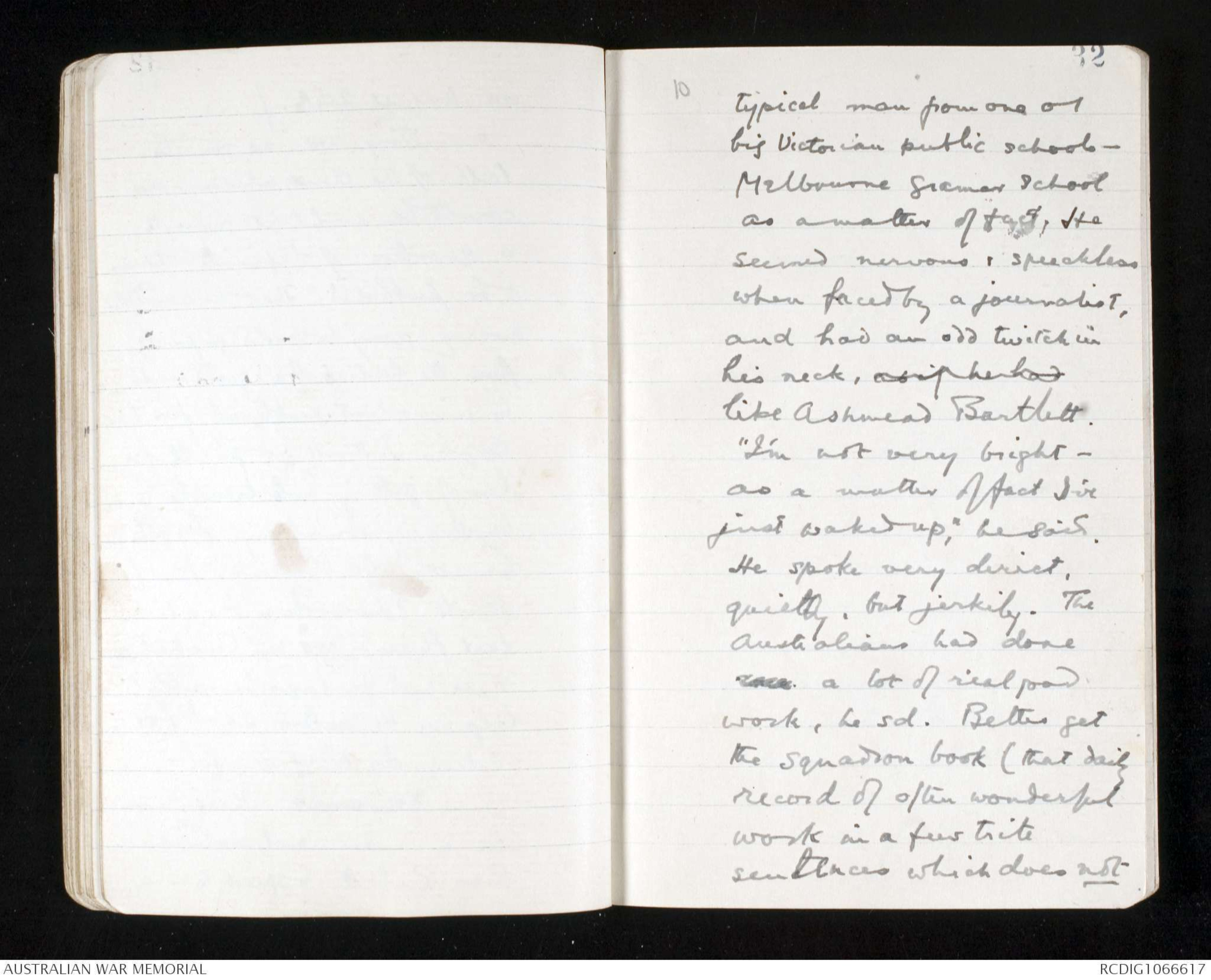
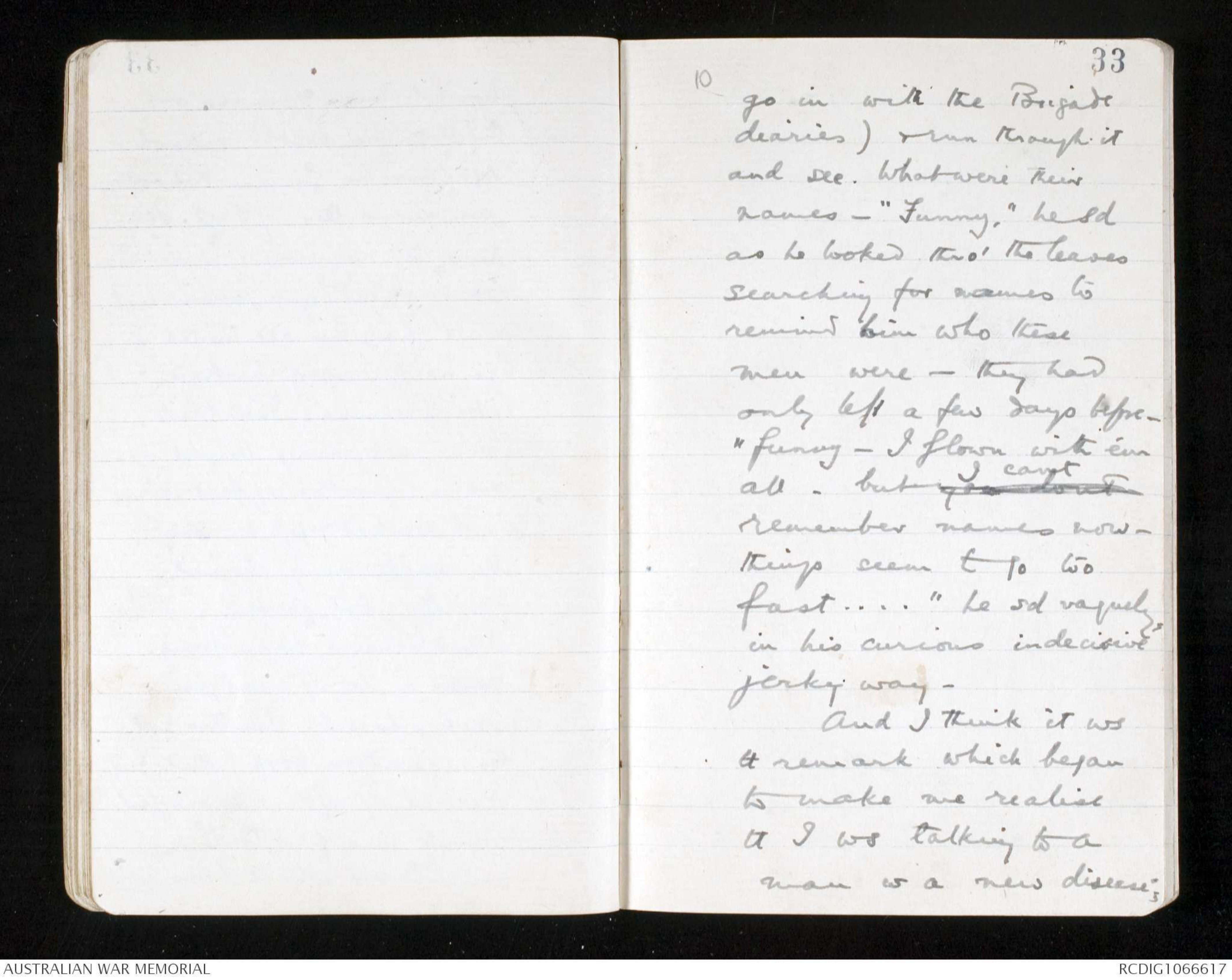
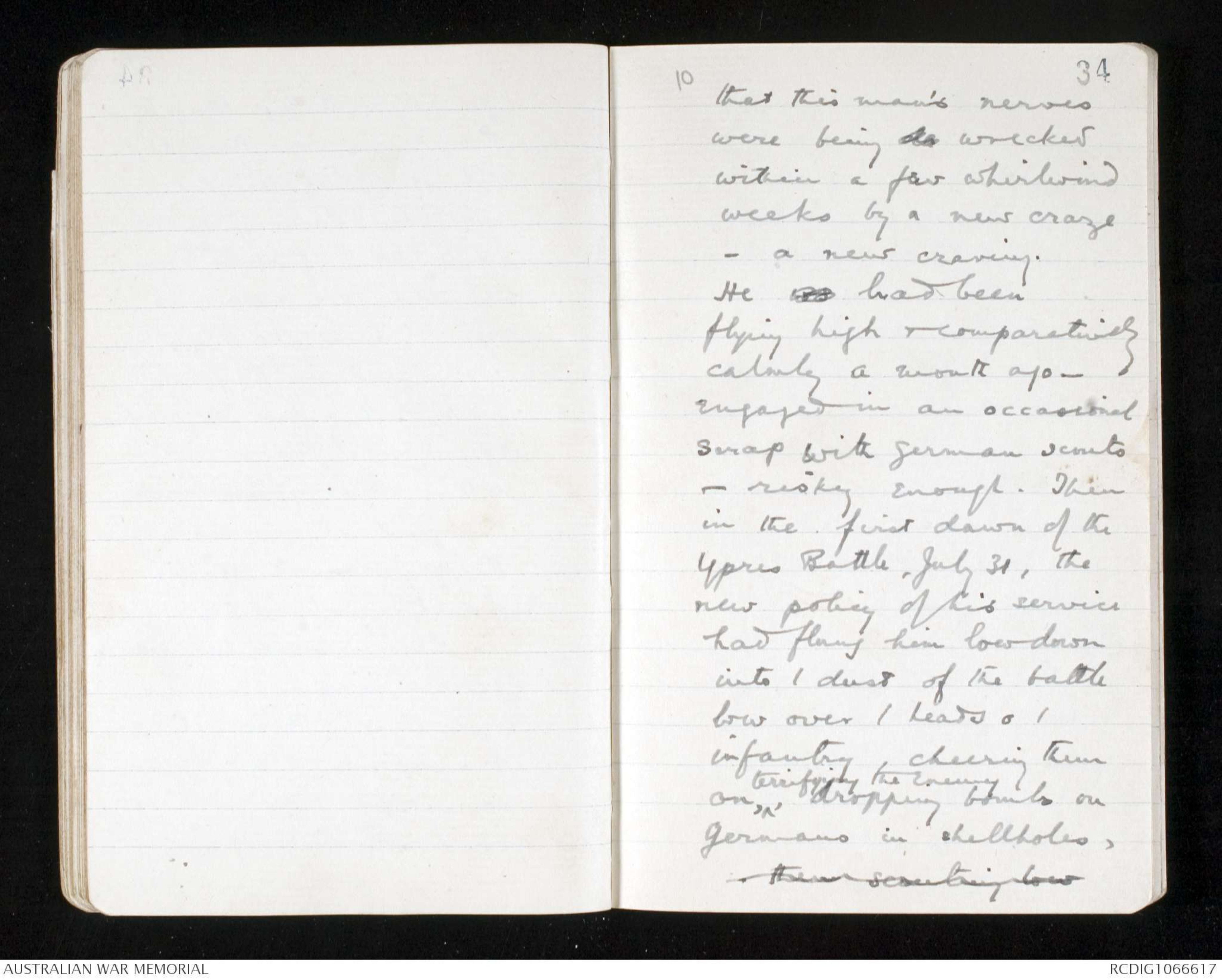
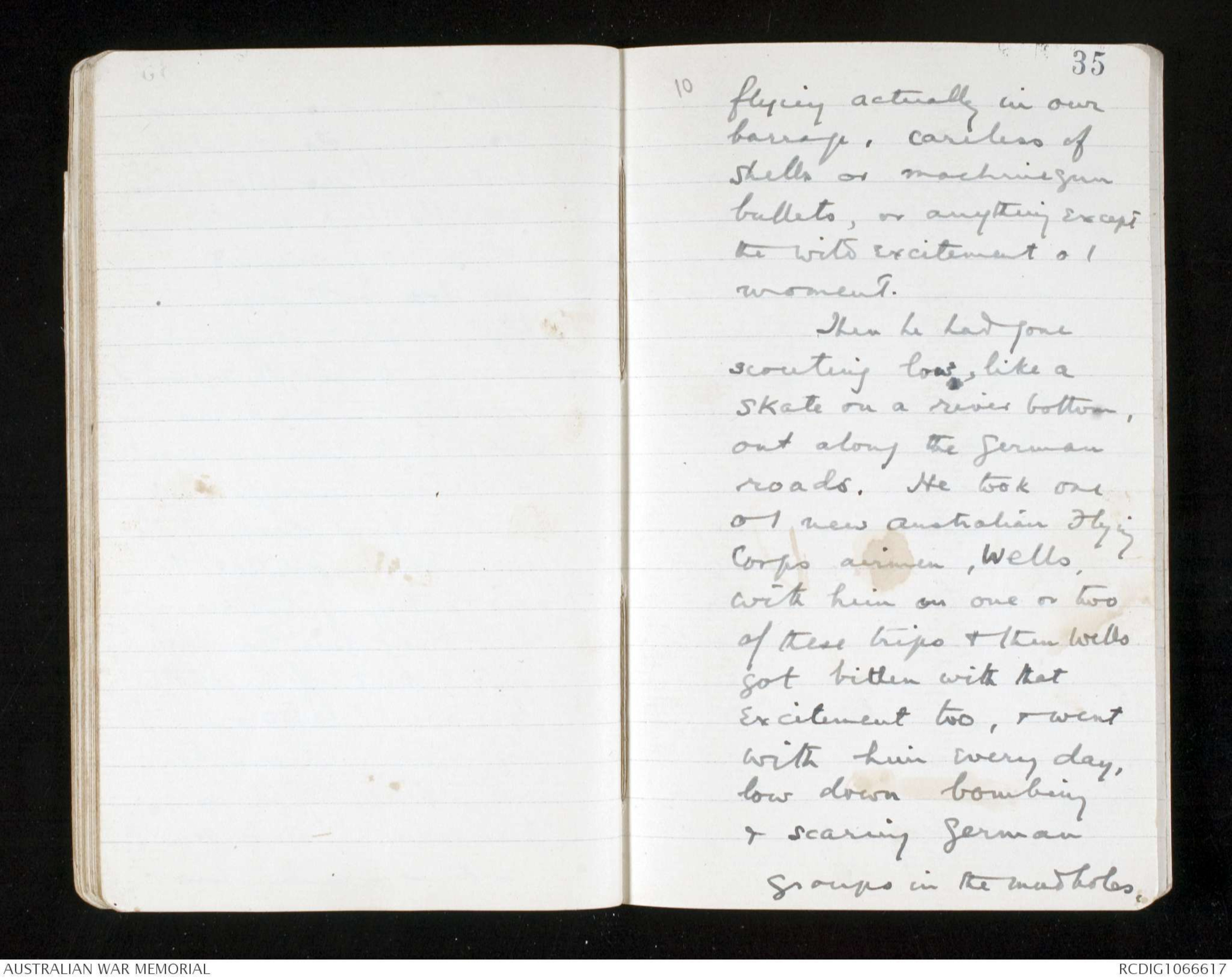
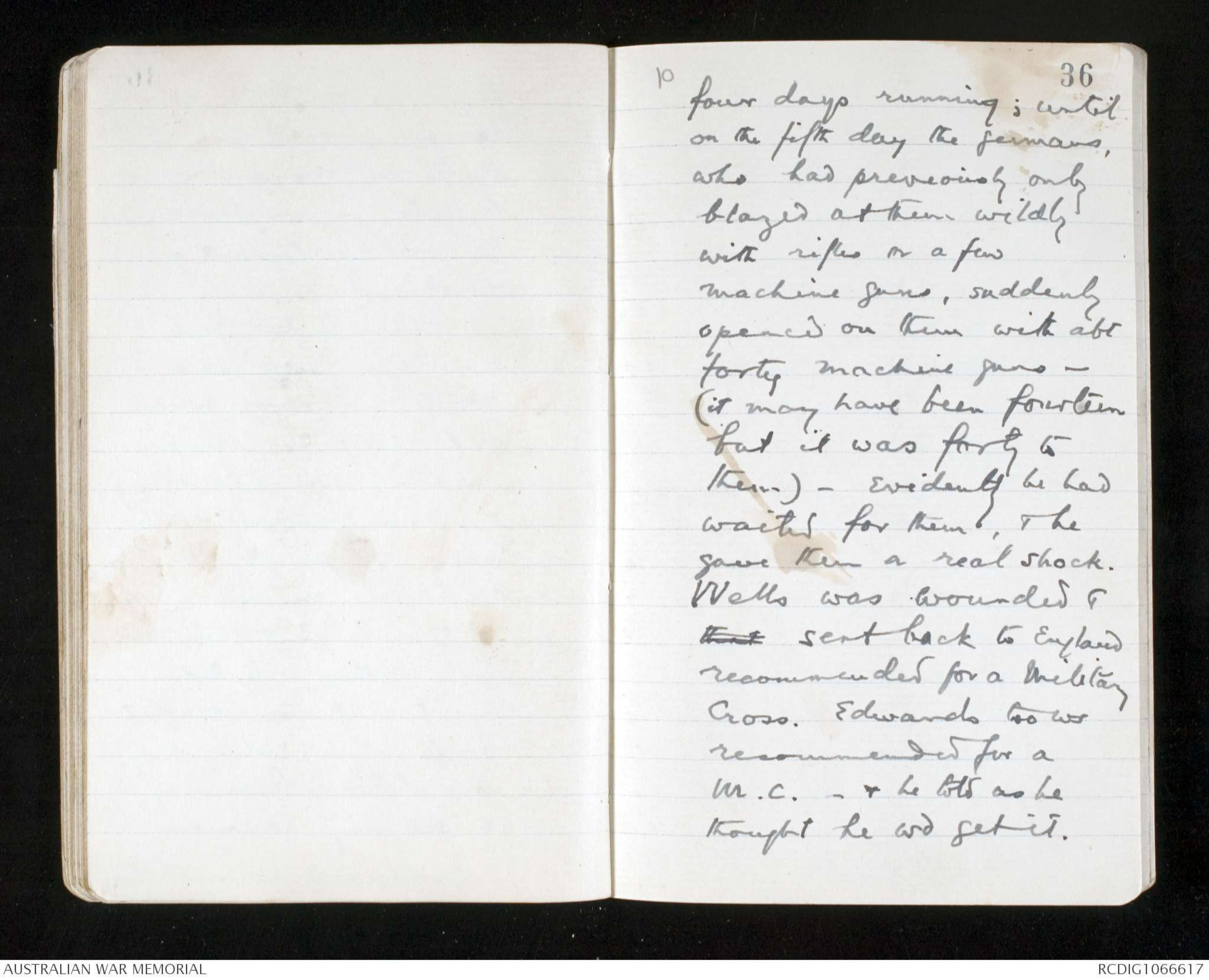
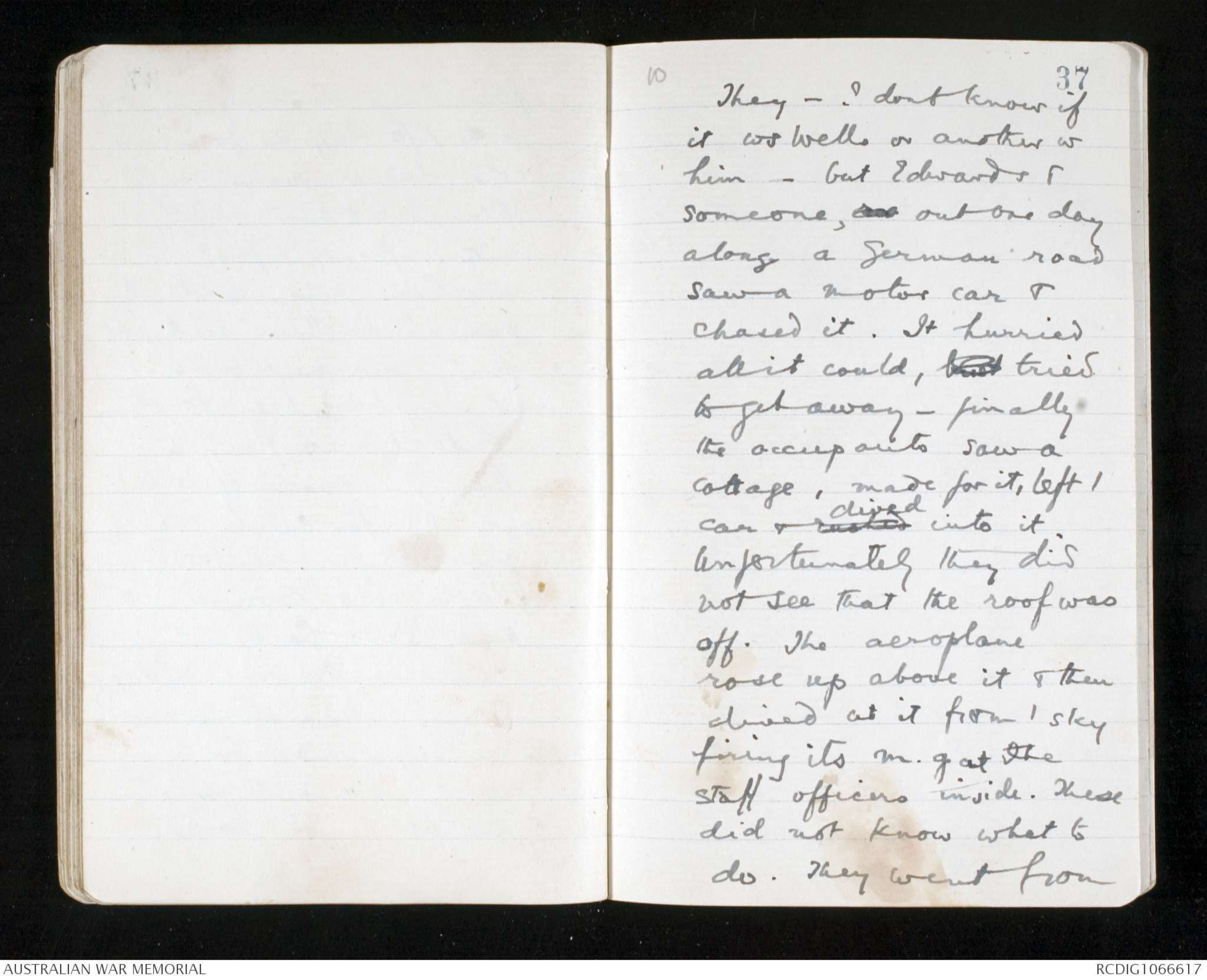
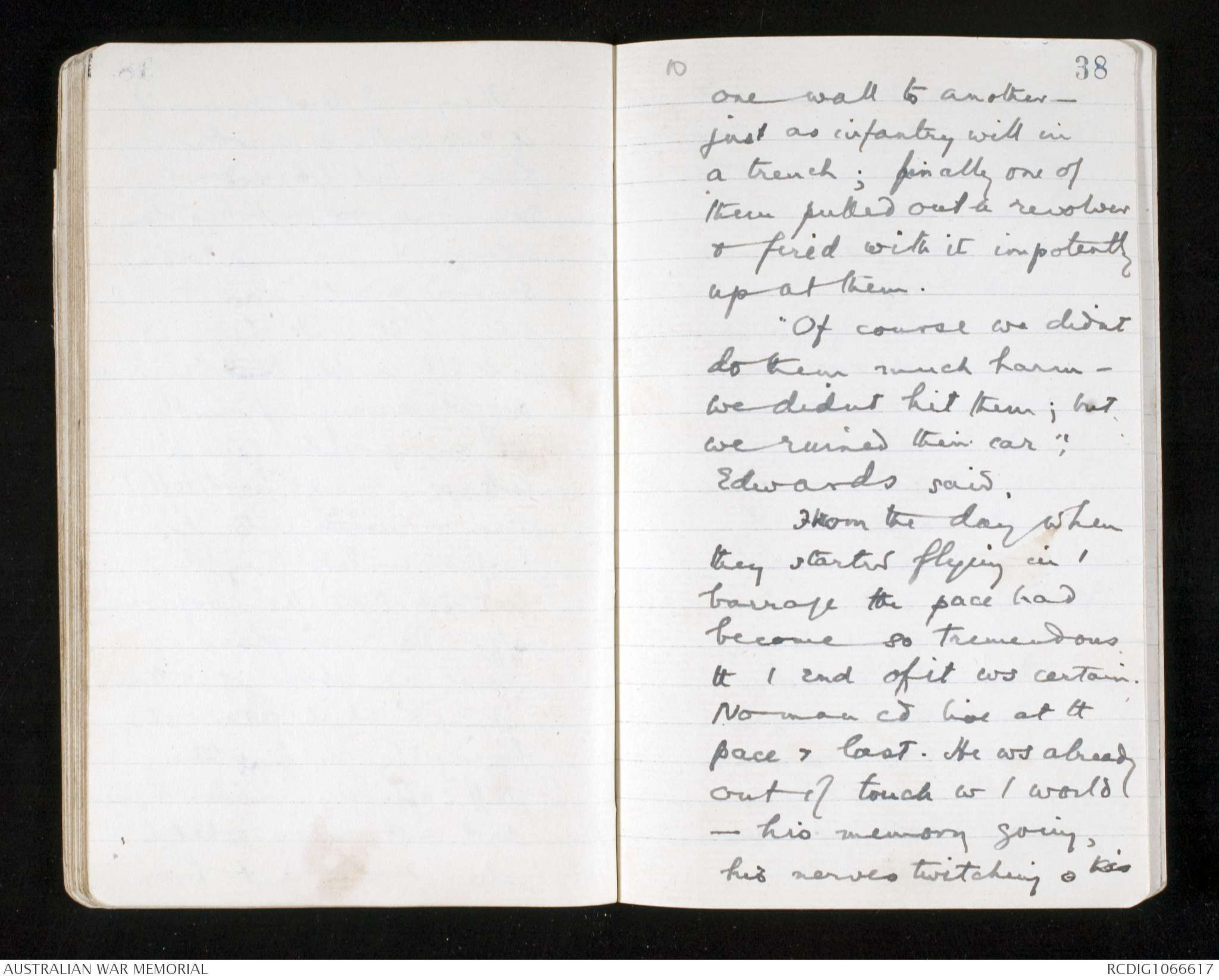
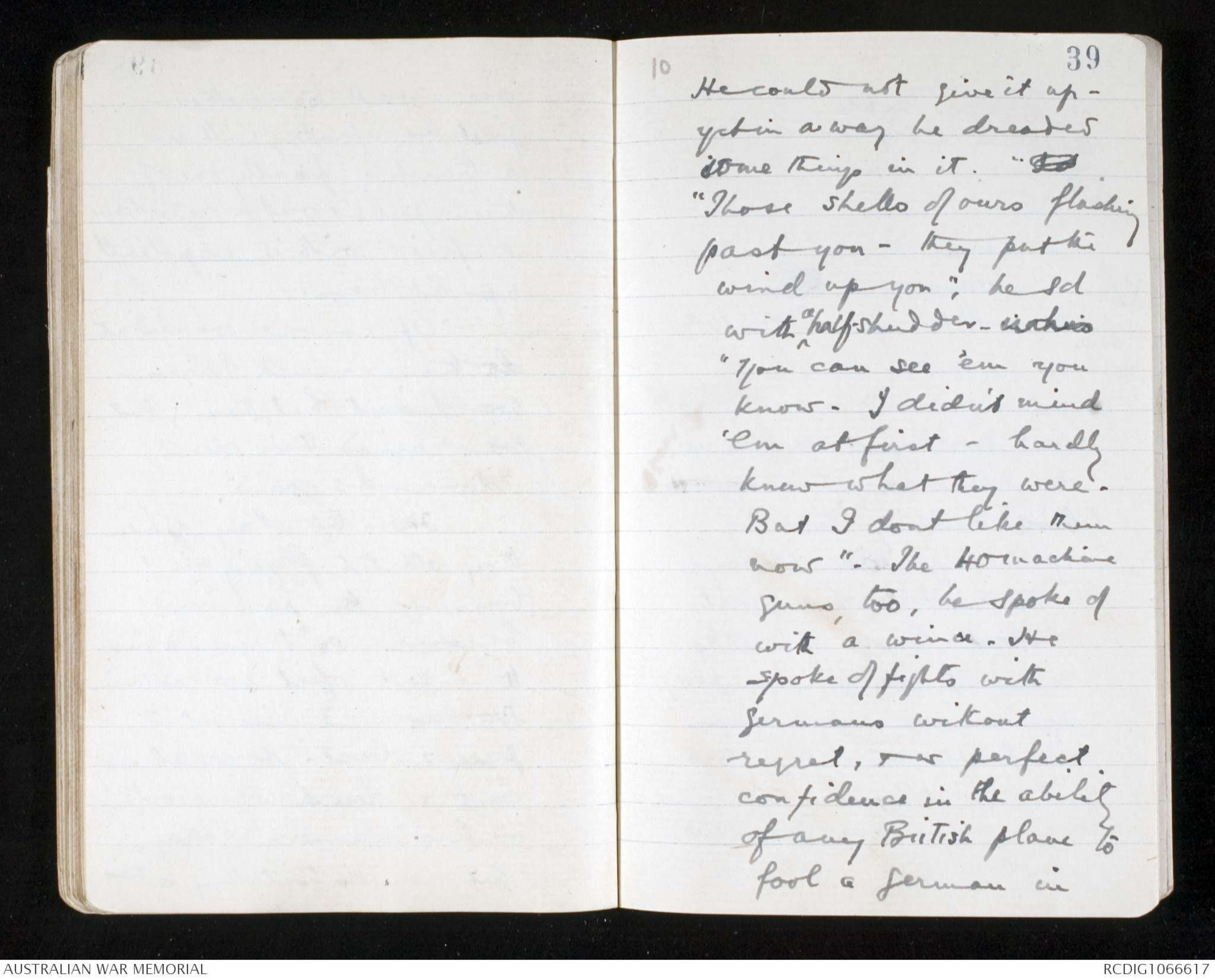
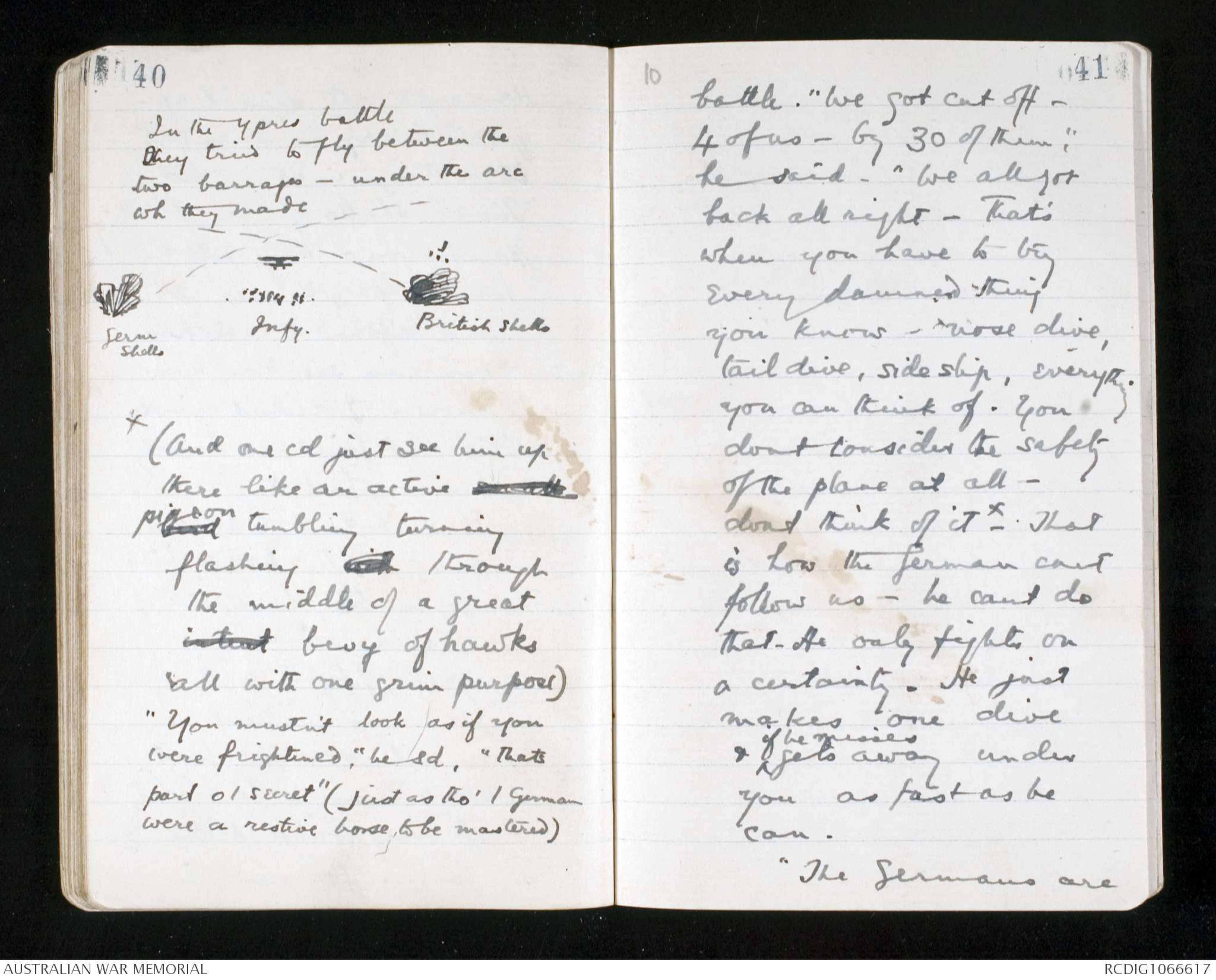
10 31
on August 29th.]
Joy ws as glad to
talk of the Australians as
could be until it came to
a question of definite stories
to be published. That he avoided
every way he could - partly
from the hatred of a good man
to immodest. publicity for his
corps, I think; & partly for
fear of getting into trouble
by saying something for wh
he wd be blamed. But he
sd tt Edwards- one o /
best fliers - ws an Australian
& he wd perhaps be able to
help us. He called sent for
Edwards to come in.Edwards There came
in a man not unlike
Rex Rabett to speak to - a
10 32
typical man from one o /
big Victorian public schools -
Melbourne Gramar School
as a matter of fact. He
seemed nervous & speechless
when faced by a journalist,
and had an odd twitch in
his neck, as if he had
like Ashmead Bartlett.
"I'm not very bright -
as a matter of fact I've
just waked up," he said
He spoke very direct.
quietly, but jerkily. The
Australians had done
a lot of real good
work, he sd. Better get
the squadron book (that daily
record of often wonderful
work in a few trite
sentences which does not
10 33
go in with the Brigade
diaries) & run through it
and see. What were their
names - "Funny", he sd
as he looked thro' the leaves
searching for names to
remind him who these
men were - they had
only left a few days before -
"funny - I flown with 'em
all- but you dont I cant
remember names now -
things seem to go too
fast . . . ." he sd vaguely
in his curious indecisive
jerky way-
And I think it ws
tt remark which began
to make me realise
tt I ws talking to a
man w a new disease;
10 34
that this man's nerves
were being da wrecked
within a few whirlwind
weeks by a new craze
- a new craving.
He ws had been
flying high & comparatively
calmly a month ago -
engaged in an occasional
scrap with German scouts
- risky enough. Then
in the first dawn of the
Ypres Battle, July 31, the
new policy of his service
had flung him low down
into / dust of the battle
low over / heads o /
infantry cheering them
on, ^terrifying the enemy dropping bombs on
Germans in shellholes,then scouting low
10 35
flying actually in our
barrage, careless of
shells or machine gun
bullets, or anything except
the wild excitement o /
moment.
Then he had gone
scouting low, like a
skate on a river bottom,
out along the German
roads. He took one
o / new Australian Flying
Corps airmen, Wells,
with him on one or two
of these trips & then Wells
got bitten with that
excitement too, & went
with him every day,
low down bombing
& scaring German
groups in the mud holes,
10 36
four days running; until
on the fifth day the Germans
who had previously only
blazed at them wildly
with rifles or a few
machine guns, suddenly
opened on them with abt
forty machine guns -
(it may have been fourteen
but it was forty to
them) - evidently he had
waited for them, & he
gave them a real shock.
Wells was wounded &that sent back to England
recommended for a Military
Cross. Edwards too ws
recommended for a
M.C. - & he told us he
thought he wd get it.
10 37
They - I dont know if
it ws Wells or another w
him - but Edwards &
someone, one out one day
along a German road
saw a motor car &
chased it. It hurried
all it could, but tried
to get away - finally
the occupants saw a
cottage, made for it, left /
car & rushed dived into it.
Unfortunately they did
not see that the roof was
off. The aeroplane
rose up above it & then
dived at it from / sky
firing its m.g at the
staff officers inside. These
did not know what to
do. They went from
10 38
one wall to another -
just as infantry will in
a trench; finally one of
them pulled out a revolver
& fired with it impotently
up at them.
"Of course we didnt
do them much harm -
we didn't hit them; but
we ruined their car,"
Edwards said.
From the day when
they started flying in /
barrage the pace had
become so tremendous
tt / end of it ws certain.
No man cd live at tt
pace & last. He as already
out of touch w / world
- his memory going,
his nerves twitching. his
10 39
He could not give it up -
yet in a way he dreaded
some things in it. " I d
"Those shells of ours flashing
past you - they put the
wind up you," he sd
with ^a half-shudder - in his
"you can see 'em you
know. I didn't mind
'em at first - hardly
knew what they were.
But I dont like them
now". The 40 machine
guns, too, he spoke of
with a wince. He
spoke of fights with
Germans without
regret, & w perfect
confidence in the ability
of any British plane to
fool a German in
40
In the Ypres battle
They tried to fly between the
two barrages - under the arc
wh they made
Hand drawn diagram - please see original
X (and one cd just see him up
there like an active xxxxxxbird pigeon tumbling turning
flashing with through
the middle of a greatintent bevy of hawks
all with one grim purpose)
"You mustn't look as if you
were frightened," he sd, "Thats
part of / secret" (Just as tho' / German
were a restive horse, to be mastered)
10 41
battle. "We got cut off -
4 of us - by 30 of them."
he said. "We all got
back all right - That's
when you have to try
every damned thing
you know - nose dive,
tail dive, side slip, everything
you can think of. You
dont consider the safety
of the plane at all -
don't think of it X - That
is how the German cant
follow us - he cant do
that - He only fights on
a certainty. He just
makes one dive
& ^if he misses gets away under
you as fast as be
can.
"The Germans are
 Loretta Corbett
Loretta CorbettThis transcription item is now locked to you for editing. To release the lock either Save your changes or Cancel.
This lock will be automatically released after 60 minutes of inactivity.